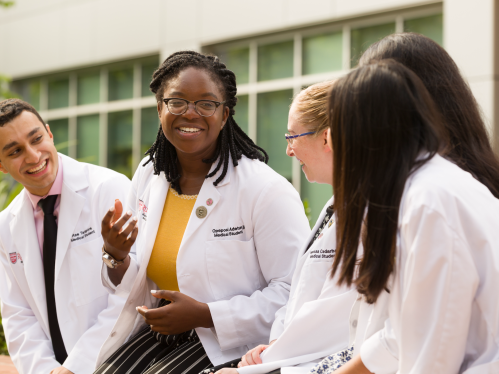Cardiothoracic Surgery Residency
Overview of the Program
Welcome to the Cardiothoracic Surgery Fellowship at Robert Wood Johnson Medical School. This is a two-year ACGME-accredited program with one fellow accepted per year. We offer comprehensive training in cardiothoracic surgery and accept applicants in either cardiac or thoracic track.
Our program provides exposure to a full spectrum of cardiothoracic procedures and boasts one of the highest cardiac surgery volumes in the Northeast—performing over 1700 cases a year; including more than 400 structural heart cases, half of which are performed with a mini-thoracotomy. On the thoracic side, we are proud to offer one of the nation’s only robotic tracheobronchoplasty experiences, in addition to a high volume of lobectomies, segmentectomies, and esophagectomies. With only one fellow on each service at any given time, trainees benefit from significant hands-on experience without competition for cases.
Fellows primarily train at Robert Wood Johnson University Hospital, with additional opportunities to rotate at the Children’s Hospital of Philadelphia and Newark Beth Israel, further enriching the breadth of clinical exposure.
Didactics
- Weekly lecture with an attending based on STS curriculum
- Weekly tumor board and heart failure conference
- Monthly journal club with Newark Beth Israel CT fellows
- Monthly M&M conference
Accordion Content
-
Leonard Y Lee, MD
James W. Mackenzie, M.D. Professor and Chair, Department of SurgeryRichard Lazzaro, MD
Professor, Chief of Thoracic SurgeryMark J Russo, MD
Professor, Chief of Cardiac SurgeryAnthony Lemaire, MD
Program Director, Associate ProfessorJohn E Langenfeld, MD
Associate ProfessorTimothy Hughes, MD
Assistant ProfessorHirohisa Ikegami, MD
Assistant ProfessorIoannis Kontopidis, MD
Assistant ProfessorBenjamin Medina, MD
Assistant ProfessorAshley J McCormack, MD
Assistant ProfessorGengo Sunagawa, MD
Assistant Professor -
Alexander Byun, MD
Residency: Rutgers Health- New Jersey Medical SchoolTyler Draeger, MD (Starting 2025)
Residency: Icahn School of Medicine at Mount Sinai, South NassauSarah Halbert, MD (Starting 2026)
Residency: Medstar Georgetown/Washington Hospital Center
Benefits and Salary
Our residency and fellowship programs offer a uniform package of benefits consistent with those provided at all graduate medical educational programs operated by the medical school. Full details regarding benefits and salary are continuously updated by the Office of Graduate Medical Education.

Contact Us
Anthony Lemaire, MD
Program Director
Assistant Professor of Surgery
Division of Cardiac Surgery
Alyssa Robinson
Residency Coordinator
Division of Cardiac Surgery
Email: adr162@rwjms.rutgers.edu

